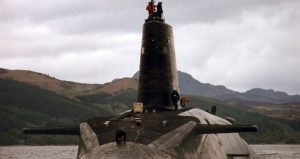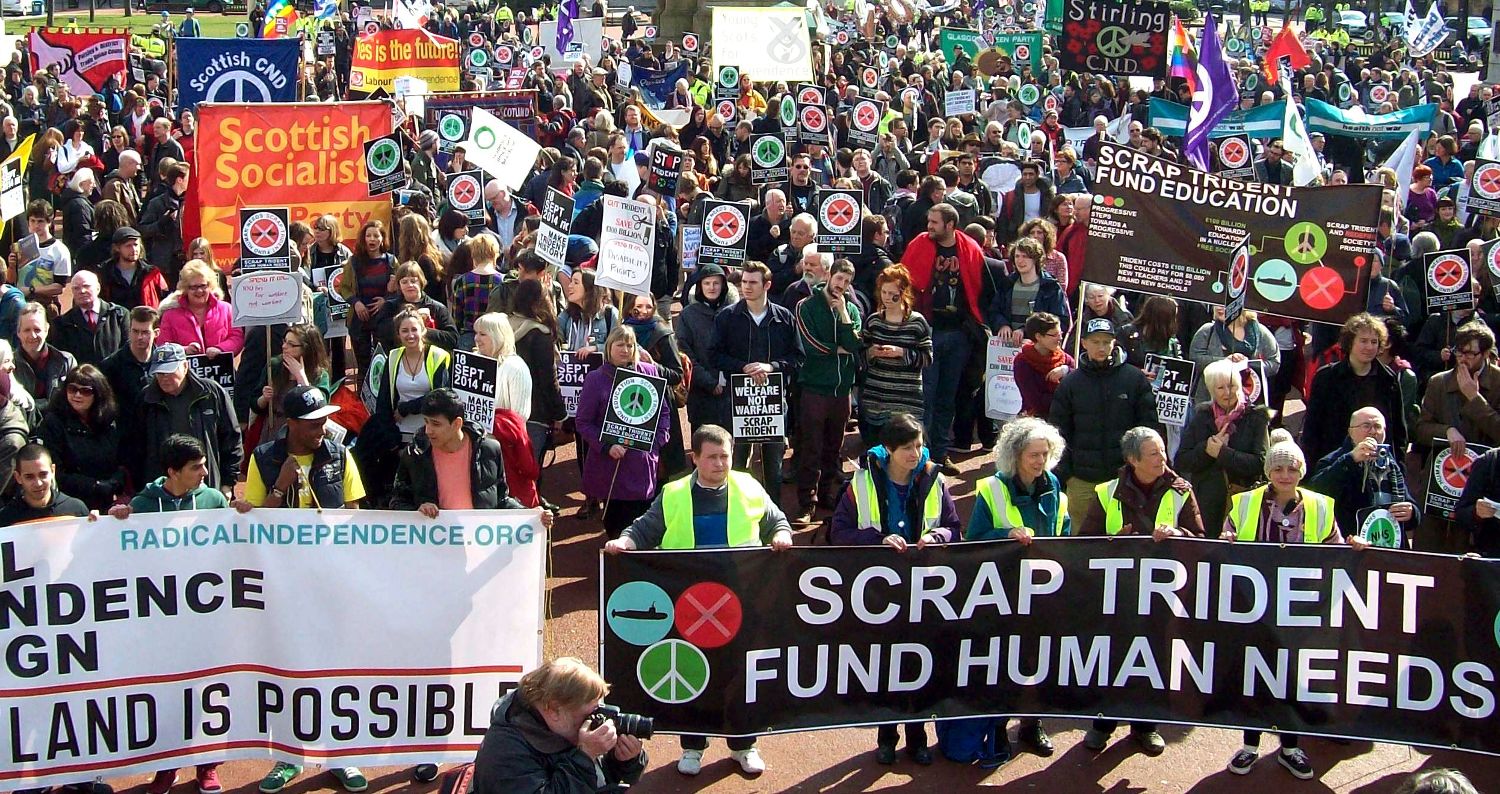 by Calum Martin
by Calum Martin
Weapons Of Mass Destruction. They don’t protect us from acts of terror. They don’t shield us from infrastructural cyberattacks. Hideously expensive, morally indefensible and functionally purposeless, they are some of the most dangerous and expensive relics in the world. So what point is there in keeping them?
“Well,” squawks many a rich Tory politician in protest, “what about the irreplaceable jobs nukes provide?” It’s a claim which has started to echo outwards into the broader debate.
It is a claim however which is fundamentally baseless.
Let’s start with the actual numbers. Little over 500 people work at the Faslane base, the majority of them regular naval personnel, or military police.
 The numbers directly tied to the weapons being atomic are minuscule. Even taking the imagined job losses from scrapping the nukes to their most apocalyptic extreme, the two main shipyards which provide the relevant materials for the submarines themselves tally slightly over 4,000 further jobs each.
The numbers directly tied to the weapons being atomic are minuscule. Even taking the imagined job losses from scrapping the nukes to their most apocalyptic extreme, the two main shipyards which provide the relevant materials for the submarines themselves tally slightly over 4,000 further jobs each.
That could sound a lot. However the argument implies that without WMDs, not only would all these jobs simply cease to exist (the overwhelming majority wouldn’t), but that those skilled engineers who work directly on these weapons are simply incapable of producing anything else.
It’s a notion which is as insulting as it is incorrect. There are much better uses that weapons plants could be turned to. It’s an argument that has been best made by weapons engineers themselves!
Trade unions lead the way
The best example of this is the Lucas plan. In the early 1970s, Lucas Aerospace, one of the UK’s leading arms manufacturers announced a period of major “restructuring”, closing down factories and wiping out swathes of UK jobs in a bid to increase profit margins. There was no alternative, the executives wailed.
If the jobs were to be saved, then the country would have to commit to vast increases in military expenditure — expenditure which could be siphoned off into the pockets of those very executives.
The Lucas Aerospace Combine Shop Stewards Committee, or The Combine, however knew better. The Combine was a body bringing together representatives of the engineering and manual unions from all fifteen Lucas sites. Originally, the shop stewards had established it to allow better coordination between staff and unions across these different sites. The company had a history of attempting to leaving the pay for many staff lagging behind, and Union coordination was key to turning that around. In 1976 the Combine made headlines with a new pitch. True, aerospace contracts were down, but facing down the job losses, the Combine produced a set of clear, commercially sensible, plans as to how the jobs and factories could be saved by turning production over to more socially beneficial goods.
Through the democratic structures they had built up, folks were able to propose possible products they knew they and their equipment could produce. Life-saving medical technologies, such as kidney dialysis machines. Safer braking technologies to improve transport safety. Pioneering energy technologies such as wind turbines and solar panels.
The company immediately rejected the plan. From up high in the boardroom, it was easier to simply close the factories. The plan gained widespread international attention. Yet the chance to implement it was vetoed for the sake of an executive cash-in. The company has subsequently gone bust.
Climate change
The idea however still holds water. There are things we all need far more pressingly than bombs. The real threat to our country today comes not from impending war. I dare say we’re not likely to see the North Korean army paddling up the Clyde or the Forth any time soon. I’d wager it’s not Trident that’s stopping them either.
The real pressing threats we face today are more systemic. The creeping devastation of climate change grow worse each year. It is no coincidence that every passing year seems to bring record heatwaves.
 The raging wildfires striking from Greece to Sweden stand as a tragic testimony to the consequences. The ever growing costs of inequality bite deeper each year.
The raging wildfires striking from Greece to Sweden stand as a tragic testimony to the consequences. The ever growing costs of inequality bite deeper each year.
Record profits for big pharma, power companies directly translate into mounting illness and fuel poverty worldwide. It’s time we spent less producing the weapons for a hypothetical war against life, and more on the weapons for the wars we really need to fight. For the war against climate change! For the war on want!
This is not some wild, emotive appeal to echo into thin air. Just as the Lucas plan represented a clear, viable alternative to the challenges posed then, there are clear, viable alternatives to the challenges posed now.
Groups like the STUC, Trade Unions for Energy Democracy, the Campaign Against Climate Change Trade Union Group, — I could go on — all of them and more have produced viable, transformative, industrial plans to face down these modern challenges.
Nae nukes/more jobs
Plans which would see new jobs for Trident engineers helping solve climate change. Consider. We need new generators, turbines and power storage capacity. We need modernised electrical infrastructure.
We’re talking up to 100,000 secure, well-paid, skilled jobs in Scotland alone. I shudder to think how many thousands upon thousands of new WMDs we’d need to create those same numbers.
As for Faslane itself? Two of our best comparable neighbours, Denmark and Norway have WMD-free, conventional navies of just under 4,000 personnel each. These are navies of defence, not of nuclear annihilation.
These are the sorts of navy we’d be looking at in an independent Scotland. Let’s just do the maths again for a moment. That’s a lot more than 500 jobs at Faslane. So let’s dump the idea that we need nukes for jobs. It’s time to re-industrialise and take on the real challenges of our new, modern era.
This article was previously published in issue 510 of the Scottish Socialist Voice.
